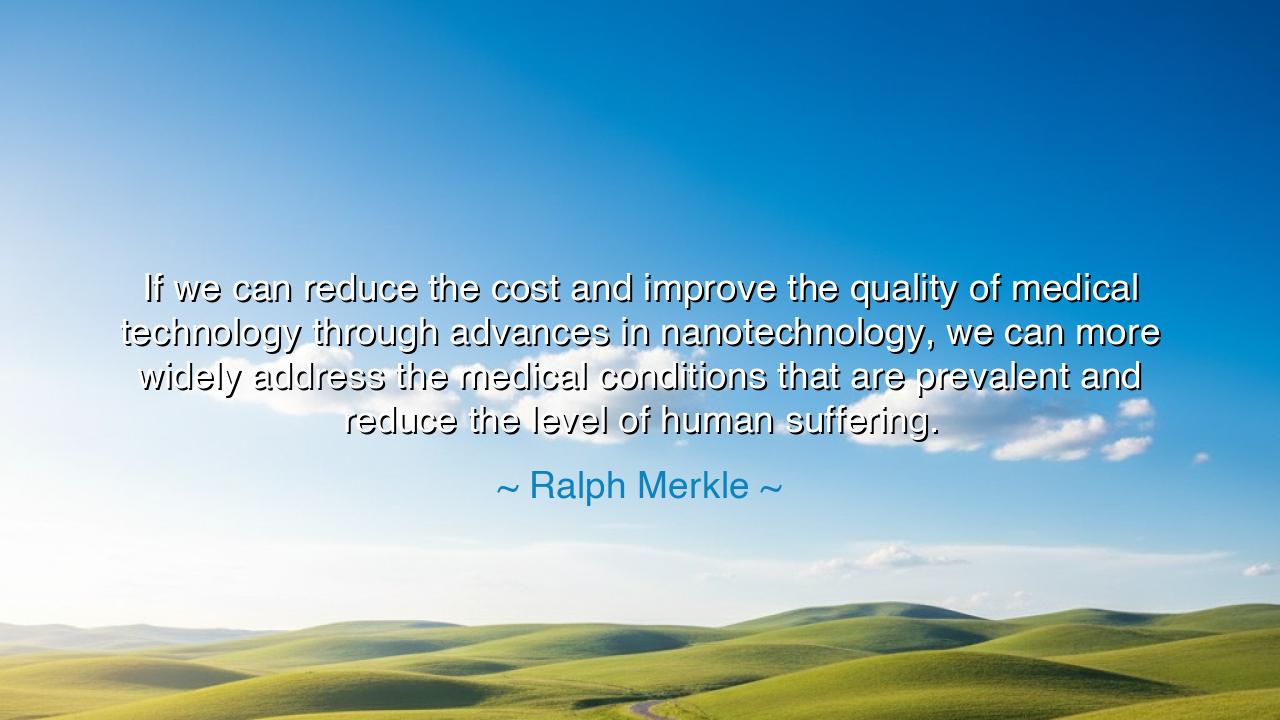
If we can reduce the cost and improve the quality of medical
If we can reduce the cost and improve the quality of medical technology through advances in nanotechnology, we can more widely address the medical conditions that are prevalent and reduce the level of human suffering.






In the visionary words of Ralph Merkle, “If we can reduce the cost and improve the quality of medical technology through advances in nanotechnology, we can more widely address the medical conditions that are prevalent and reduce the level of human suffering,” we hear not just the voice of a scientist, but of a prophet of compassion. His statement reaches beyond laboratories and equations — it speaks to the eternal human desire to heal, to lessen the burden of pain, and to use knowledge not as a weapon of dominance but as a tool of mercy. These words, like an echo from the future, remind us that progress divorced from empathy is hollow, but when science serves the spirit of humanity, it becomes sacred.
The origin of this quote lies in Merkle’s lifelong exploration of nanotechnology — the science of manipulating matter at the smallest scales, where atoms themselves become instruments of creation. A pioneer in the field of molecular engineering, Merkle envisions a world where machines no larger than cells repair the body from within, curing diseases before they cause pain, mending organs without the knife, and restoring sight, breath, and strength to those who suffer. In his dream lies the modern continuation of an ancient pursuit — the pursuit of healing without harm, of harmony between the human body and the forces of creation. Just as the alchemists sought the elixir of life, Merkle’s nanotechnology seeks to transform suffering into wellness through understanding, precision, and love.
To the ancients, the physician was more than a healer of flesh — he was a servant of life’s sacred balance. In the temples of Asclepius, patients prayed and purified before treatment; for they knew that healing was both a science and a sacrament. Merkle’s vision revives this spirit. His technology does not simply aim to replace the healer’s hands, but to extend the healer’s reach, to bring care where distance, poverty, or limitation once closed the door. The heart of his quote beats with this simple but profound truth: that knowledge must serve compassion, and that true innovation is not measured by profit, but by the reduction of suffering.
We may recall the story of Jonas Salk, the man who developed the polio vaccine and chose not to patent it. When asked who owned the rights, he answered, “The people. Could you patent the sun?” His creation saved millions, not because it was profitable, but because it was shared. In the same way, Merkle’s vision carries the moral weight of Salk’s generosity — a call for science to serve all, not a few. By reducing cost and improving quality, he seeks to democratize healing, to ensure that a poor child in a distant village receives the same care as a wealthy man in a shining city. It is a dream of equality not born of law, but of love.
The power of nanotechnology lies not merely in its precision, but in its humility — in the idea that greatness can dwell in the smallest of things. The ancients would have called this divine irony: that the invisible might hold the key to salvation. In the same way that the invisible wind carries seeds across continents, the unseen world of molecules now carries the promise of health across generations. Merkle’s insight reminds us that progress begins where perception ends — that what we cannot see, we must still seek to understand, and that the unseen forces of creation may one day free humanity from much of its pain.
Yet, Merkle’s wisdom also carries a warning. He reminds us that technology is not salvation by itself. Without moral guidance, invention becomes perilous. The same science that heals can also harm; the same tools that cure disease can craft weapons. Thus, he calls for wisdom equal to our power, compassion equal to our knowledge. His dream of reducing suffering is not only technical, but ethical — it demands that humanity evolve not only in skill but in spirit. For if we create miracles without kindness, we build temples of steel with no gods within.
From this reflection we draw a timeless lesson: let knowledge serve life, not pride. Let every advance be measured not in wealth or fame, but in the number of hearts eased and lives restored. The future of medicine, Merkle tells us, lies not in conquest but in communion — the union of mind and matter, science and soul, precision and pity. Each of us, in our own way, can live by this creed: to use what we know to lessen pain, to share what we have to lift another, and to remember that progress without compassion is as empty as wealth without purpose.
So let us walk forward, as Merkle dreamed, into a world where wisdom is measured in mercy, and where the smallest machines may do the greatest good — where science and spirit at last join hands to end the long night of human suffering.






AAdministratorAdministrator
Welcome, honored guests. Please leave a comment, we will respond soon